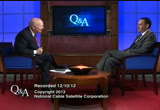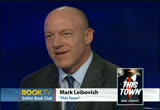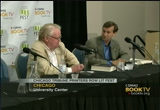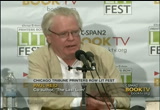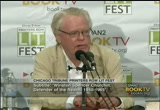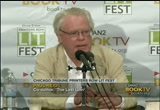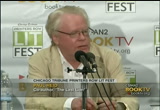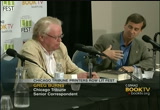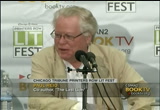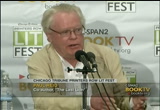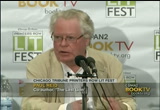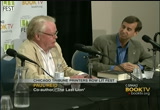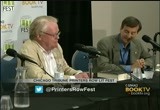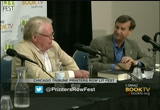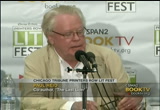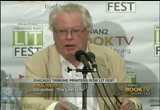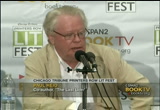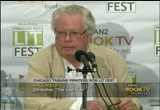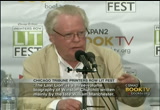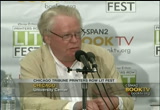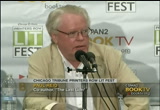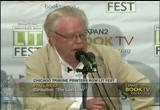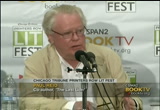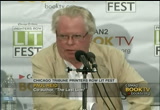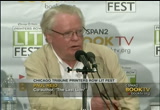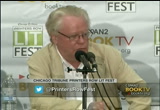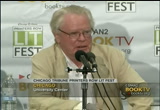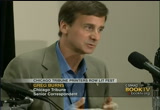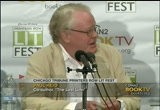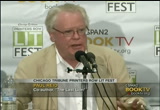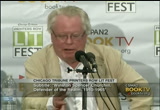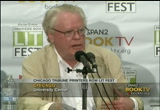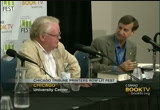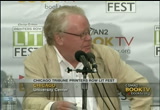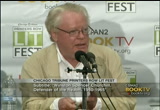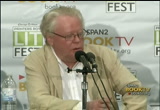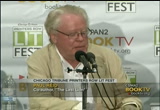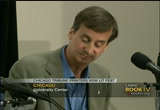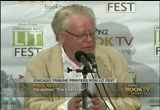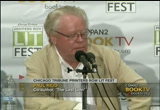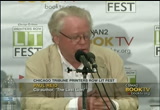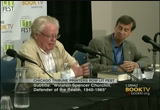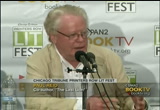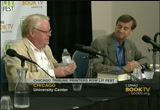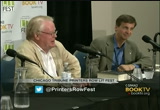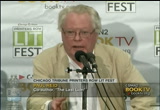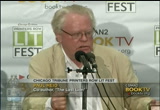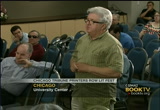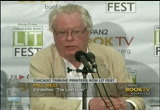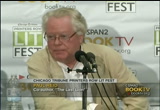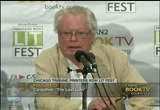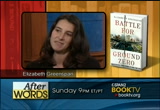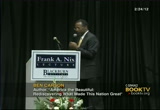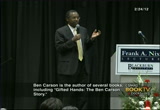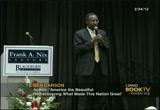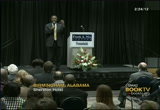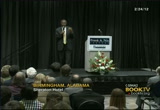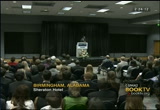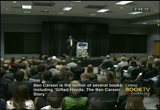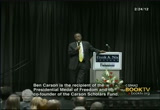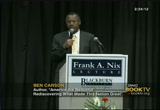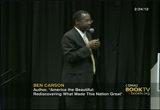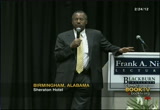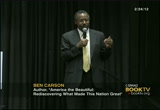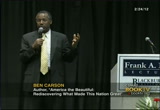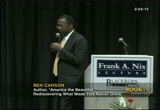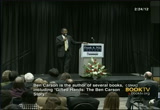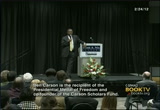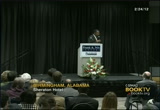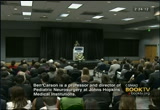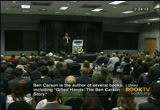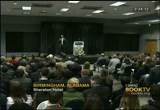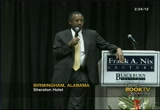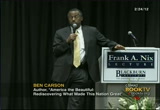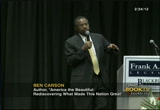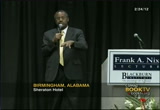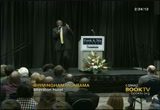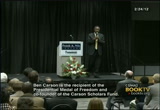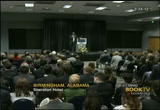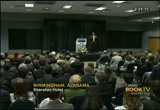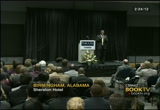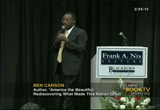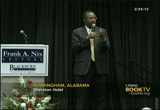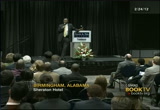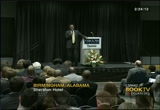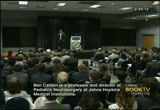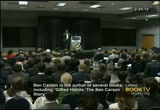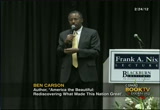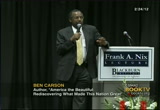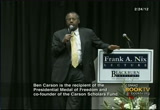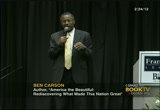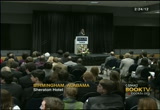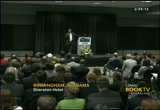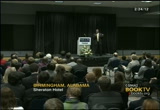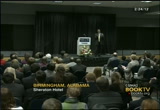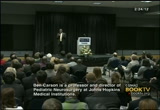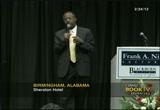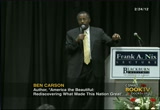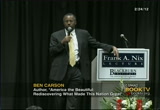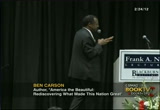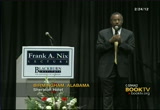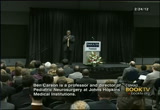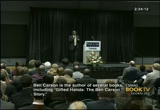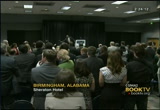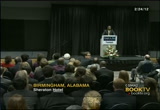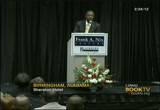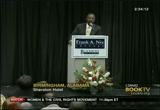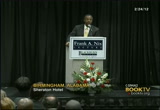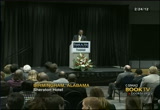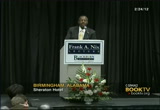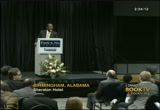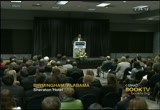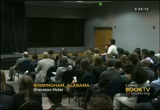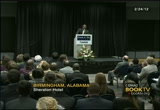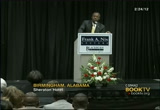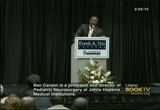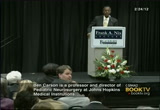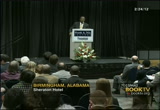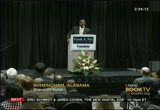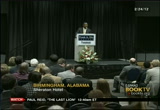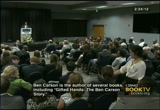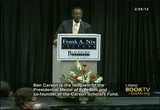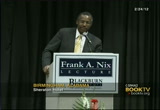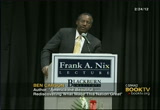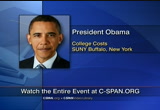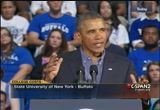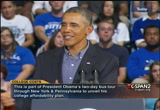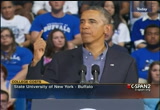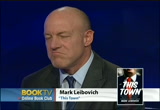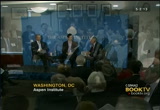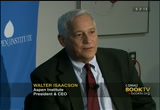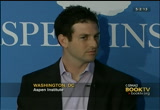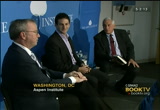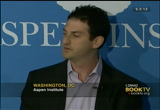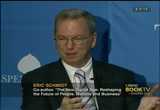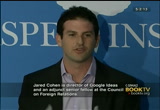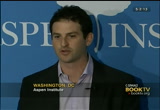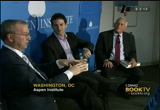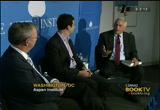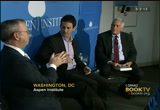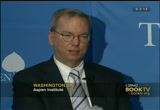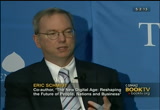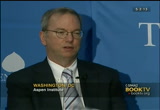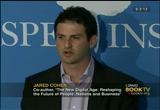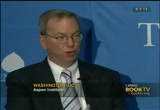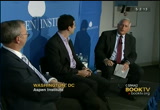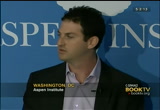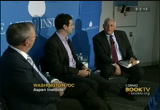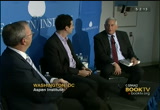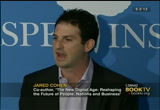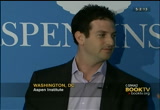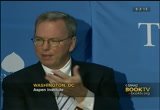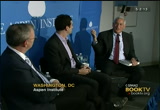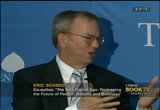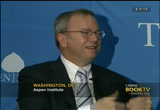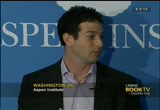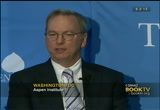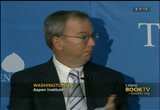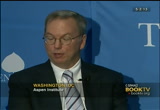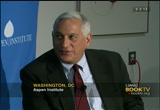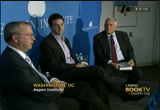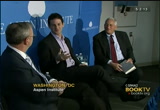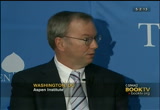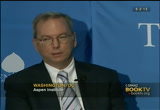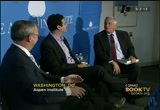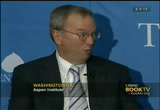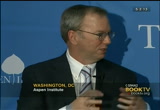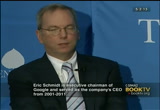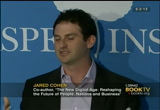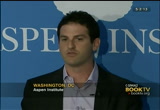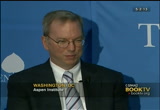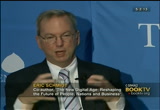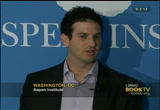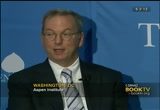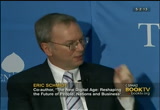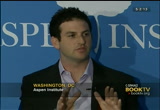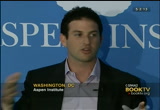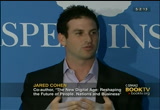tv Tonight From Washington CSPAN August 22, 2013 8:00pm-11:01pm EDT
8:00 pm
8:01 pm
criticism from inside it's been mostly in the vein of how dare he meaning how dare an insider give away the secret. how dare an insider talk about other insiders in a way that perhaps might not be in keeping with the code that we have a shinkman. people keep asking me why are people uncomfortable here? i welcome the discomfort but i also think this is what we do. we should invite discomfort. he next author paul reid talks about his book "the last lion." they were kate co-authored with
8:02 pm
the late historian william manchester. this three-part series on former prime minister winston churchill. from the printers row lit fest this is 50 minutes. >> thank you very much and thank you all for turning out on a sunday morning for this event. i'm excited to be here with paul reid. we had met before and we had talked before and we are both churchill buff so it's a measure treasure to see him again and thanks for -- thank you for coming out to chicago. we will talk for 40 minutes and leave plenty of time for questions. at the end we will hear from as many people as possible and paul will be around signing books so feel free to talk to him afterward. paul is really a wonderful guy and on top of that he is a journalist who got his start in journalism after a career in manufacturing. he was a reporter at the palm beach post in florida where he
8:03 pm
came across a group of marines who knew bill manchester the famous author of the first two volumes of "the last lion" and through his job as a feature writer paul cutugno this group and got to know bill manchester and the rest is history literally because paul went out of course to take over this book are checked and write this third volume which has been out for months and is doing very well. i have had a chance to read it here eerie at it's an amazing book. so paul, will come and tell us how this project started and how it came about to. >> the project began 60 odd years ago when i was a little boy. no. [laughter] i always get confused over this question, where did it began because it's kind of nebulous but i say again with the six marines in 1996 who served on open nala with bill manchester and they were going to have a reunion in west palm beach,
8:04 pm
florida for surviving members of their section as they called it an bill couldn't come. mr. manchester was sick and the marines had their reunion anyway and i covered it and wrote a story called for a feature and one of the marines met max douglas and sends it to bill manchester who liked it and sent me a nice little note which was quite something for a rookie 46-year-old feature writer to get. a couple of years later the same marines went to middletown connecticut where mr. manchester lived. he had two strokes in 199098 and his wife of 50 years judy had died that summer, and five marines went up there to boost his morale. they invited me along to do another story and my editor tom o'hare at the post loved these stories. south florida is where veterans go alternately and i interviewed
8:05 pm
pearl harbor veterans and took arizona survivor out to rural in 2001. it's just marvelous to write the stories and meet these men and women. so i went up to middletown with the five marines and spent i think two nights in three days or three nights and four days with them. i will never forget the first night i met william manchester and we all had dinner togetherns not yet in a wheelchair. he made it very clear he could no longer rate. he hadn't lost his memory or wit or charm. he'd love to read, but he just could not put words to paper and now is the great tragedy with bill. i took notes he and i remember one night, just really moved me
8:06 pm
around 10:00, 10:30 it may have a woman student not of the door and she was 20, 21 and had two books. i forget what they were, but she wanted mr. manchester to simon for her father who was a veteran and he invited her and, sat her down and the sixfold marine spent the next hour and a half talking about okinawan and this young woman i'm sure had never heard anything like that before in probably never will sense, these guys reminiscing. so i wrote my story and a year or so later wrote another and another and my daughter recite you master middletown at the time, so every time a visitor i visit mr. manchester became friends and five years later in 2003 after the yankees beat the red dots as usual, october 9 at the playoff game, he was having a jack daniels popped up in bed.
8:07 pm
i was in an easy chair and he turned to me and said paul, i think you to finish the book and it took me a split second to realize what he was asking me because we " because we knew "the new york times" had done a story that there was going to be no one to finish the book. he had made that public will manchester had and i had tried to encourage him a few years earlier to find someone and he pretty much told me to drop the subject comp and i did until last night and to say i was flabbergasted would be an understatement. >> so he was on his deathbed at that point was was he nodded then he asked you to take over the book but he collected clumps i think he called it. there was a lot of information and having read it i wonder how much -- bill manchester is a famous author and wrote death of a president about jfk and about
8:08 pm
general macarthur. >> in october 2003 when bill asked me to write the work he was very very sick and had been for five years but not quite deathbed yet. when he asked me he had a jack daniels and his doctor kept him to one or two a day. i said al, can you sneak another one in here somewhere? he said no paul my -- and it was but then in the next six months he got very sick, very sick and died on june 1, 2004. he sent the home that weekend with a bunch of what he called his long notes or clumps and every time i'm at a place like this i remind myself i should have brought one. essentially they were eight and a half by 11 pads of paper, 50 pages each tape that the middle
8:09 pm
so what you ended up with was 50 pages of eight and a half by 22. that is why he called them his long notes, onto which he would glue or tape xerox copies of pages from books. he did this back in the 80s, well the 80s and he had about 50 or 55 of these clumps which essentially are 100 pages each so that's about 5000 pages on which were extracts from speeches from telegrams from stalin or the to roosevelt or the diary entries from more than 100 sources. many primary newspapers the london times, "the new york times" come code harry hopkins, churchill, churchill's family
8:10 pm
come to roosevelt's dog. everyone had a place in the nose but they weren't strictly chronological nor where they strictly by topic. so charles degaulle was scattered through 20 or 30 of these clumps that pretty much might address 1940 to 1944 but there was no charles degaulle section and there was no way to to -- you know when i watch elections now and the anchors on the air touching the screen and showing the county in ohio that obama needs to win and this collating of information that can be done, this was longhand and i realized pretty quick he that the notes couldn't serve me as they had bill. i couldn't figure out the source codes or the topic codes, the key he had lost. he had secret codes. our ex-were his
8:11 pm
entries. that one i entered -- the deuce but others were a number sign with an eight in it. i didn't know if that meant and i try to deduce from reading the page the secret code was on. i made a lot of headway. that might've had to do with family so if i saw four or five entries about churchill's children with the with an aid in it i would realize what that means family. well, i would be doing this for the next 20 years. so i had to find a new way or away to reinvent the wheel and i had a brainstorm. i called the wesleyan library and i asked for all the notes that bill had ever taken out. they said i'm sorry that's private. how about this? can you send being of all the loot bookshfñ?ñ? -- a list of ae
8:12 pm
books that were overdue? the new bill and he said well i guess we could do that and the list was about 20 pages long. on it for all the diaries and the collected speeches of churchill and roosevelt biographies and all the sources essentially. which i then went on amazon five or six years ago and looked for everything and assembled essentially the same sources bill had in my house along with the latest editions of the speeches and newly-released british archive papers and what have you. and started in that way too as i say to write a thousand feature stories and connect them such a the end you get a book. >> so that was eight years of labour and it shows. the book is extremely detailed as you you now and also it's a t read here it i know that one of
8:13 pm
the difficult parts of channeling bill manchester was he didn't want each just write a history. he didn't want a chronology. he wanted the story and you can see from paul already that he's a great storyteller but this is a great story to tell. this runs from 1940 until churchill's death in 1965 so the the biggest events. one thing i love paul about this book in the two that preceded it that manchester wrote by himself for the preambles and these were 50 or 60 page beginnings of the book that tried to clue you into who churchill is. it's like a movie trailer with traits and family life and nuggets of history and it talks about clementina, churchilchurchil l's wife. it gives you a sense of who he is and how he was full of contradictions and kind to animals and children are vice versa, i can't remember. who is he and what did you decide goes in there? >> as you say the first two books have these beautiful practices and preambles.
8:14 pm
bill would change the terminology and early on my editor and i thought one we want this to be a stand-alone book and make the reading public. we didn't want people to go to bookstores and say oh my goodness i would like to read that but i have to buy the first to? we wanted to stress to people that it's a stand-alone story so we did the 55 or 60 page prologue which has the film trailer as you say, a sketch of churchill a portrait in pencil that the book ultimately flushes out. we wanted to introduce churchill to people who may not have ever met him. his eating habits and his drinking habits in the so-called depression which i don't think was accurate to -- and give you a picture of the man so that when you encourage him doing something really crazy on page
8:15 pm
200 you don't think what is this guy? you have party met him and you are expecting him to be somewhat eccentric. he developed a his suit that he could wear during the blitz. essentially it was like a working man's overalls with a zipper so he could jump right into it instead of putting back on his evening clothes and his staff called it went since rompers. he called it his siren suit that he would jump into it whenever the siren sounded. then he would wear monogrammed slippers that his wife gave him, velvet slippers with pom-poms with wfc on them and his siren suit one of which was lavender for evening wear and a tin hat. and his cigar. i would go to watch the german bombers, and he would watch from the roof of i think the admiralty and his aides were
8:16 pm
mortified. bombs were falling around him and he would specifically point to an area where bomb fell. they would have to go down and get in the armored car and drive through the bombed out streets. he would be smoking and so that behavior a i wanted the reader to be prepared for that sort of behavior because only churchill behaved that way. >> he was very much a classical 19th century man with a different idea about how to run your life than most of us have. what were some of his central personality quirks? >> interestingly and especially in volume one when bill manchester writes about churchill spit tory and genesis, he was born in the 19th century and he was a victorian man of valor and honor the
8:17 pm
aristotelian was churchill's main virtue that he sought to emulate and valor and courage were very important to him but i realized going into this that he was also a classical man in the sense that he was not a religious man. he took his ethics from pre-christian socratic aristotelian platonic ideals. he was extremely well read. he was self educated and i realized early on this is a man who would have been comparable with plato at the academy hundreds of years before the christian ideals evolved. and i wanted to stress that. he was not an old fuddy-duddy too long in the sun englishman with a cork, don and a nutty victorian.
8:18 pm
he was a very complex classical man. >> and quite an experience having dinner with him from what i gather in the book. his eating and drinking in table conversations takes up quite a bit. >> he loved his dinners but he was the one who gave me the line that his idea of a perfect evening was a wonderful meal in the company of friends with wonderful conversation with himself as the center of it. followed by drinks and more comp are stationed with himself as the center of it and all of the folks who knew him, the diary entries and i would check to see a particular diary entry wasn't just cherry-picked or someone had a grudge but everyone agreed that churchill didn't care if 12 of us were sitting at his table. he didn't care what we thought and certainly didn't care what we felt in the modern sense.
8:19 pm
it was all about churchill and he was absolutely honest when he said that what he a wonderful evening and his doctor said it was a cricket analogy but he said at dinner compact winston bats and everyone else catches and he was so insulated from people including at times his family and he didn't like to be touched. years later after the war he was standing on the steps in monte carlo having probably just lost millions. he had had lucky in gambling and frank sinatra ran up the steps and he grabbed his hand and shook it and said i have always wanted to do that. he bounded down the stairs and churchill turned her private secretary who was always with him and said who the hell was that? [laughter] and his world, he was the center
8:20 pm
of his world. >> of course the moment that everyone remembers that counts the most was when the book opens. france has fallen a powerful member of churchill's cabinet wants a peace deal with hitler and of course we know how this all turns out. tell us where the book picks up and what churchill is thinking at that time. >> it pics are pretty much at the battle of france which wasn't long in passing. 38, 40 days between may 9 when hitler came through the arden to june 21 when the french agreed to surrendering terms which just log old churchill's mind. the french army is the greatest largest and best in some regards in europe and the english expeditionary force was miniscule by comparison. so the book picks up with the battle for france.
8:21 pm
the french loss of will and the backbone is churchill sought almost at the trail when the french asked the english for all of their remaining fighter plane reserves. churchill would have sent it very and he would do things like that and as air marshals told him sir, that's it. the french have lost. if we send their remaining airplanes over there when the germans come, and they are coming, we will be defenseless and dunkirk took place. he got the men off the beaches but left their luggage behind as he put it. their tanks, to their guns and from that almond on bill manchester started from there into the blitz and the invasion scare. very early on i realized the invasion scare was a function of churchill's genius propaganda. he never believed the germans were coming.
8:22 pm
but he wanted to build up his armies and the best way to build up his armies would be to keep people on their toes and scared to death that the germans were coming. and he did that and at dinner july 12 i think he was going to make a speech on the 14th and there are the diary entries. at dinner he said we must keep this invasion scare going. it's the best thing to get an offense of army so growing up i always had the operation sea lion and the germans were about to come in any moment in the battle of written was this great heroic air battle that decided the war. all along during those months churchill knew that he believes strongly the germans weren't coming for one simple reason. they had to cross water and they didn't have the posted to it. he kept in his pocket, he kept the numbers. the germans didn't have the
8:23 pm
merchant shipping and the trip characters and they had no landing craft. it was the d-day trapdoor variety and he was supremely confident that the germans were never coming but boy he capped up that scare of the invasion imminent at any minute. >> that was one of the things from the book and the other was the relationship between churchill and roosevelt which after the war was portrayed his great love and affection. it wasn't really that way at least at this point when the book opens. >> i'd have loved history all of my life so i didn't go into this blind but i had sort of an americanized version of franklin roosevelt and my father in the naval academy and i remember him telling me 55 years ago the destroyers that fdr sent to england saved churchill's
8:24 pm
chestnuts. that's my old man speaking. england only got seven of them by then end of 1940 and roosevelt was very widely and played a very dangerous game of slowly progressing toward more and not fast enough for churchill and not fast enough perhaps for the saving of western civilization in europe. the telegrams between churchill and roosevelt, the correspondents, the conversations i didn't find them to be as somebody's. barely friends and i think after the war in his memoirs churchill started referring to tears in his eyes when he saw a roosevelt in failing health and the sort of thing. in order to rewrite the history which churchill's memoirs were exactly that. a rewriting of the history of the war. >> and it seemed as if another source of conflict for them was
8:25 pm
churchill's belief that roosevelt was in over his head dealing with with stalin another prominent figure in the book. >> roosevelt told his aides that if only he could sit down upon with uncle joe, stalin as he called him everything would be settled. and andy went behind churchill's back to the iran conference and did just that. to the mortification of the american and english aides to come. and roosevelt and his own people said this. he liked a cruel joke. he'd like to laugh at other peoples expense and he did that to churchill a lot. i interviewed churchill's daughter lady solms who said my father was really hurt by that that he was never unmanned buy it but churchill thought this friend of his vote him more than that. churchill's aides the generals and admirals thought what is
8:26 pm
roosevelt doing? we the english fought for two years alone before america dribbled onto the scene and the english did and roosevelt in the american press spun the whole story. the invasion of north africa in 1942. there was no mention of the british being involved in the american press at first. he was a very interesting relationship between the three of them. >> one of the unsung heroes in the book is one of churchill's many aides of diarist who is also sort of a figure himself. he seems as if he really got the fly on the wall version. he drew on his work quite a bit. >> he should have kept a diary and he knew it. he could've been imprisoned for quite a long time but that diary opens the window onto churchill
8:27 pm
in private life during the war and everyone uses it. it's just absolutely marvelous because colville was with the prime minister at chamberlain's funeral if you will and it inner many many nights. on his foreign journeys so colville, colville's diaries are more accurate in the sense that churchill's remembrances -- of colville wasn't there they would only have churchill's word to take for everything and his word at times with self-serving. >> and another unsung hero from what i can tell is mali patrick downes who i have not paid attention to until i read -- read this book. she was a novelist who became the british letter writer to america about what was happening all the way through the end of the war in her work was
8:28 pm
published. it really stands up well in history. i notice you have drawn on her work a lot too. >> that was one of the sources that i could figure out on bills long notes. i found her london war notes and sure enough bill had maybe hundreds of extracts from her notes. i realized what he was doing and i did it too. she was his chorus if you will bringing into the book the day-to-day life of londoners, the ration and the way they can do up she said the little sugar cubes that as if it was mana from heaven. they couldn't get chicken and they couldn't get eggs at one point they couldn't get whiskey and then they couldn't get beer. her observations, she is seeing
8:29 pm
things that churchill saw but didn't write about it or talk about it in cabinet meetings. he was very sad about the lines of people looking for horse meat which wasn't rationed in europe then apparently with ikea it still isn't. so i used her a lot because i knew bill manchester was going to and that was really down on his part. it's funny there have been a lot of picky reviews out there. what is with this molly patrick downes? she is everywhere. yes, sir user eyes and ears into the east end of london 70 years ago when he won't get it from the times of london then or from a cabinet meeting memo. now there are other people over there doing that and william l. shirer had come back from germany but mali served as again
8:30 pm
a voice to bring us away from the cabinet meetings and the reaction on the eastern front and back to london and londoners which really london men's are two of the characters in the book. the first 500 pages. >> you know another relationship was between churchill and allen ruck do is field marshal and had this imposition of martial of united states. these two could not have been more different which came across brilliantly and it's amazing the ration -- relationship lasted. >> churchill never fired his let terry chiefs and all of them quit all the time and none of them ever did. burke's diaries are just a tear. they were a riot. the guy was literally pulling his hair out of her churchill burke would write my god i don't
8:31 pm
know where we are going without him but i don't know where we are going with him. i checked admiral cunningham's memoirs and a mirror burke's exactly so i used burke's. i did to seem as if i was piling on churchill. berkin cunningham and the top is all pretty much felt the same way that winston is a loose canon and churchill wanted to in invade normandy roads in north africa and france too. all at the same time and roosevelt and marshall wanted only to go to the shores of france. now that is another place where churchill has gotten kind of a bum rap in the states. he didn't oppose the second front out of belligerents or stubbornness. he opposed a premature second
8:32 pm
front on the shores of france and he was right. finally everyone realized he was right. if marshall had his way they would have gone to france in the summer of 1942 and that would have been the end of theuld have been the end of the involvement in the european war. they would have been thrown off. these diaries montgomery cunningham and harry hopkins, they all get the window onto churchill and the main characters and it was my job and bill manchester's again not to cherry-pick. people have said this is a very mixed review of churchill. he was a very mixed man. >> one thing that does come across the land you just alluded to it is how he kept up the fight and that seems like his biggest contribution. it didn't matter his success in the mediterranean but he wanted to fight and he was always looking for a way to punch the
8:33 pm
enemy right then, right now. >> he wasn't a think and not losing the war during those long months of 1940 and 1941 almost three years and not losing the war he and england won the war. it gave us the time to come in and during that time he wanted to hit anyplace he could anyway he could buy the celini, by submarine. mussolini. december 7, 1941 but what happened to the rest of your? in england it was a horrible year. it was worse than 1940 and i wanted that to come through. churchill january and march and april and june and september of
8:34 pm
1941 was still fighting alone. franklin roosevelt in his september 11 address said challenge the germans to shoot at american ships in the atlantic. at one point he said if you see a rattlesnake you don't stop in and think. you crush it and he had thrown down a challenge to hitler. early in september the chairman's tried to purpy though the u.s. destroyer. a month later they tried and they did hit another u.s. destroyer and in the end of october at the sunk the rubin james with 150 men going down with the ship so there are three attacks on u.s. shipping and at that point churchill realized this country america is never going to war unless they do so on their terms and their good time when something far greater than the loss of a destroyer takes place. he thought on the morning after
8:35 pm
the rubin james went down churchill thought he would have a declaration of of war by the u.s. that afternoon. he didn't. >> we know how this ends and how the warrant but i think one thing that amazes americans and it's definitely in the book churchill got kicked out and he was no longer in office within months of signing a decree in victory. churchill won by the way with a 90% victory margin but because of the english system his party lost and it's just amazing that he was out of office as soon as he won. >> that's another story that i grew up with in a way and the ungrateful english throughout winston's savior and the pacific war wasn't yet over. he wanted to finish the job. the european war was over and they scheduled elections and
8:36 pm
they have them and inexplicably due to my father is out of office. if you look at the campaign churchill was an old liberal. in 1912 he with the old welshman his name i'm forgetting. he began social insurance and unemployment compensation. this was 20 years before the new deal. churchill was in old and and liberal but during the war he kept all of that under wraps. he didn't want to as he told his aides, to offer shangri-la or utopia to the english people. it was going to be tough after the war. let's win the war of. during the campaign he let loose and they think this was a dealbreaker for the english people, he compared the labour party to socialist parties and they were socialist doctrinaire. he said in a temple meant them
8:37 pm
labor is going to need something like a gestapo was his word. the wrong thing to say to these millions of men who are coming home after four and a half, five years of war. they were fighting for gestapo philosophy all those years and to say these good and decent people would turn into nazis. i think that is what caused churchill the election. >> once he lost power and once he gave the very famous speech and coined the phrase iron curtain and the surprise for me in the book was how badly that speech went over with his american counterparts. here is churchill out of power. that was very unwall come. >> the russians throughout the war in england and the u.s. were heroes. henry luce "time" magazine "life" magazine.
8:38 pm
forget the pogroms and the mass murders and the ukrainian famine. all of that was not mentioned. these brave russians were winning the war and they did actually. the russian army with the ten-minute casualties defeated hitler. so in 1946 most americans including harry truman thought they most thought the russians were still heroes in many thought you just can't do this to our former ally. it's not gentlemanly. before the ink was dry in may of 1945 when the germans surrendered churchill was planning his next war. it was code-named operation unthinkable just to fight the russians and work again is pulling his hair out. this is may 13 and 14th and he was saying when some want to go to war again i guess russia. that was the bit premature and divided his time and by the time he made the missouri speech people were beginning to see just what stalin was doing and
8:39 pm
all the capitals of eastern europe or behind the iron curtain and a year and half later chairman came out with the truman doctrine, took over her addition baldwin in the eastern mediterranean and the rest is history as we say. >> one part of the book churchill recognized the difference between an atomic on which he thought of as a tactical weapon in the hydrogen bomb which he thought of as a weapon. >> that moved me a lot and i remember thinking this is where the book ends with churchill leaving office in 1955. there is a 20 page addendum if you will of the final years of his life, very sad and very sick but his last speech in the house of parliament and the house of commons in march 1935 was another warning that the h-bomb was a, infinitely more dangerous
8:40 pm
than the atomic on which 10 years earlier he and roosevelt saw it as a strategic weapon the atomic tom and they used it and it worked. eisenhower in the mid-50's saw the h-bomb the same way as a tactical battlefield variety strategic weapon. churchill again was ahead of his time and he came up with the concept of mutually-assured destructiondhñ?ñ? and said the y value of these things is to thed beautiful speech in march 1955 and he said i sometimes wonder if god is wearied of mankind and the little children who were playing might not either in a generation now is the last time he spoke in the house. for me, that's his greatest
8:41 pm
legacy. he saved civilization twice if you will. once against hitler and once with this concept of weak kneed h-bombs for the sake of never having to use them. contradictory, but this way were here today. >> that is the last book of the words i remembered. the big one is what you just said. >> i really think if you value schopenhauer and plato and shakespeare and freud and victims seen in the whole legacy of the classic western tradition he saved it. if you go down outlives aware bridge for it be if hitler could get his hands on him were victims seen, it's just so obvious they were just mind boggling insane gods/evil and
8:42 pm
for two years, one man among country is fighting them alone. tallinn was in bed with them. so that was the first war and then the legacy with the atomic tom and churchill school after the war in his second premiership was to sit down at the table. he coined the word summit meeting to sit down at the summit with the russian leaders and best men in human beings, agreed the atomic bomb -- the h-bomb simply could never be considered a weapon. something had to be done. only a person with that background and the classics of aristotelian ethics and only someone with that frame of mind would think that way.
8:43 pm
stalin certainly didn't. so yes, there's a plaque i started 30 years ago in westminster abby in the west stores about four by six secret italian marble in on it is simply says robert winston churchill. i remember thinking way back then, that's all you need to say a thousand years from now. you don't have to put anything on the plaque about what he did, who he was. the mets will transcend the legend on a thousand years from now, people will walk in there and none of them are going to ask who is winston churchill? >> thank you, paul. i welcome questions if anyone would like to approach the microphone. you know, i do have one -- people think of churchill as being quite the drinker and you address it early ink.
8:44 pm
>> he had a miraculous metabolism. that's all i can say. i created a word document and i took from all the diaries and sources i could find any reference to all nervous about the usual suspects encode the word document booze and realized his drinking was just off the charts from morning to night. wine and champagne. he had a bottle of champagne with every meal for 70 years and a dozen cigars per day and brandy at night and occasionally he got a little bit sloppy. burke mentions that in his diaries and attended a horrible meeting who apparently had a good lunch. >> eisenhauer walked in one day and there was breakfast time and churchill was in bed with a bottle of white wine. >> like churchill said, i don't
8:45 pm
like powdered milk. >> he drank a lot, but he was the nabors yeltsin but for. there is something miraculous and if some reporter tried to come to you know, do a story on not been bottle trick like churchill for a week or two and see how it goes, not going to happen. >> yes, sir. [inaudible] >> no. in fact, my editor and i chatted a lot. though manchester came of age, if you will, in the mid-20th century as a writer and i'm thinking of stephen ambrose and cornelius ryan, william manchester, [speaking in native tongue] black hats and white hats. even stand up eliot morrison,
8:46 pm
the official naval historian of world war ii when our boys are at midway in his official history, he's rooting for them and then they swoop down on the chops. they saw heroes, blackouts, white hats. mr. manchester was one of them and so we agreed that, you know, my goal was to read a write a conversational 21st century toys than the editors that if you tell a story well, nobody's going to say this doesn't sound enough like manchester. that was the goal. i will say this about though manchester's writing style and it was nifty. in his macarthur book, for instance, is a very manly sort of voice writing about general macarthur. in the churchill volumes coming manchester's prose whispers
8:47 pm
churchville. in a sense, that is though manchester putting himself in the book. it's a pretty nifty way to approach things so there is a reminder of churchill and rhetoric in the first two volumes. i hope there is here, but not as a device, just a way of getting the story told. >> you know, you mentioned about the british getting very little mention in the invasion of africa having read churchill's writings brother crisis the first world war in history the second war. in the british perspective the americans are mentioned in a footnote like the americans are here because it is always about england and he mentioned 41 and 42. do you think churchill realized if he had the strips and dominion they needed to say of
8:48 pm
the english at the umpire was coming to an end in everything he was trying to do was to keep the empire going? >> e-mail and i'm going to paraphrase here. and our finest hour speech, they will say 1000 years from now, this was their finest hour there, specifically the previous sentence he mentioned sentence he mentioned the dominion empire. from churchill you as the umpire's finest hour and he was so grateful every night that there were three or four australian divisions and new zealand divisions and canadian shipping and the canadian division came under france at the surrender of france. he knew what the dominion state for the empire, but he also note the americans were doing in 1940 and 41 until november 42 when he went to africa. >> could you comment on or do
8:49 pm
you have any enlightening comments to make about churchill's relationship with both truman and eisenhower as their presidents? >> when churchill >> you when churchill first met chairman at pazz dam he didn't think much of him. he didn't form an opinion. he didn't spend much time with german because churchill was voted out of office during that conference. because of the truman doctrine and the marshall plan after that and truman was seeing things the way churchill hoped that the new american president would see things because america now lead the world and the empire was down on the totem pole.
8:50 pm
eisenhower, churchill held a modest to two lower opinion of especially when eisenhower in office started to talk about using nuclear weapons and it's the chinese and the north koreans and at one point he said he reserved the right or if this happens we will use nuclear weapons and churchilchurchil l begged him and eisenhower did change it to be reserved the right to consider the use. again churchill didn't have that much -- truman was out of office before churchill went back into office of the never knew him in a professional sense. churchill didn't go back into office until 1952 and left office in mid-1955 so eisenhower was president for eight years of
8:51 pm
which churchill was on the scene for about three. >> unfortunately we are out of time but i would invite you to continue this conversation. paul is going to be in the book signing room which is adjacent here and i want to thank you for for your questions and your attention for coming today. it's a pleasure meeting with you paul and thank you paul. >> thank you very much. [applause] early on we said we have the 16-acre piece of land and we
8:52 pm
have to put some things on it or maybe not. it was an open-ended what can we do with it and everyone wanted to say. very quickly leaders promised a public process to receive public input to generate a master plan. at the same time that was going on however like i said before you head larry silverstein the developer who ran the lease to the office space and the port authority and they really believed in the importance of the commercial space that was destroyed. they wanted to make sure that lower manhattan remained an international financial hub and they believed in order for it to remain that reputation i had to rebuild. next ben carson ipsis thoughts
8:53 pm
on the social and political landscape in the u.s. while discussing his book "america the beautiful". he talks about the similarities between the u.s. and past empires that base decline in how the u.s. might find itself following a similar path. this is a little less than an hour and 15 minutes. [applause] >> let me just say that's more than a quarter of this entry. i'm a little older than that. but it's a real pleasure -- okay. it's a real pleasure to be here with with you all this evening. i have heard a lot about the blackmon institute and the next lectureship and i'm very honored to be a part of this distinguished group. i wanted to talk a little bit this evening about some of the
8:54 pm
things that really shaped my own life and my own philosophy. you know i was one of those people who kind of knew what i wanted to do from very early on. medicine was always the thing that interested me. if there was ever a story on television or on the radio about medicine i was right there just like a magnet. i even liked going to the doctor's office but the thing that really caught my attention was church. they frequently had stories on about missionary doctors and these were people who had great personal expense traveled all over the world to bring not only physical but mental and spiritual healing to people. they seem to be like the most noble people on the face of the earth. i decided when i was eight years old that i was going to be a missionary doctor. how was my dream until i was 13
8:55 pm
at which time having grown up in dire poverty i decided i'd rather be rich. so at that point the missionary doctor was out and psychiatrist was then. now i didn't know any psychiatrist on television they seem like rich people. they drove jaguars and lived in big fancy mansions with big plush offices and all they have to do is talk to crazy people obey. it seemed like i was doing that anyway so i said this is going to work out extremely well. i started reading psychology and i was the local shrink in high school. everybody brought me their problems. i would stroke my chin and say tell me about your mama. [laughter] and then i even majored in psychology in college and didn't dance like in medical school. i was gung ho. i was going to be the world's greatest psychiatrist. then i started meeting a bunch of psychiatrist. need i say more. [laughter] i'm just kidding. some of my best friends are psychiatrist.
8:56 pm
a what i discovered very quickly was that what psychiatrist do on television and what they do in real life are two very different things. actually what they do in real life is considerably more port considerably more pork than what they do on television. there are some intellectual members of the community but it just wasn't what i wanted to do. i have to say now what? i said what do you -- are you really good at? i believe god gives everybody special gifts and i stopped and analyzed and i realized i had a lot of eye-hand coordination. i was very careful person and never knock things over which is a good characteristic for a brain surgeon by the way. i could think and see in three dimensions and i loved to dissect things. that coupled with love of the brain i said you would be a natural neurosurgeon. some people thought that was
8:57 pm
kind of a strange occupation for me because at that time there is only ever been eight black neurosurgeons in the world. by ned never stops to think about things like that. i stopped and thought about where do you fit and it turned out to be a very excellent choice for me. i started out as an adult neurosurgeon but i very quickly learned that the the sum matter how good an operation you do on those chronic pain patients they never get any better until they get their settlement. [laughter] whereas with children what you see is what you get. when they feel good you know they feel good and you know when they feel bad you know they feel bad. here's the thing. you can operate on a kid for 12, 14, 16 hours and if you are successfully your reward may be
8:58 pm
40, 50, 60 years of life whereas with an old you spend all that time operating and they die in five years or something else. i wanted to get a big return on my investment. i'm just kidding. i like old people. actually i'm one of them. and actually a large part of my practice now involves a condition that affects primarily older people called trigeminal neurologist. a very painful condition of the face. it used to be called a suicide disease the pain was so bad. we have the ability to get rid of that pain and all to you there's nothing like seeing somebody who had their life turned upside down to be able to do a procedure and all of a sudden they have their life back. that is really what medicine is all about being able to intervene at times like that and make a difference. before i go any further i want to take just a brief moment for a disclaimer.
8:59 pm
everybody makes disclaimers these days. have you noticed that? i belong to this board or i'm associated with this group and you take everything with a grain of salt. well what i have noticed in recent years is that it's now virtually impossible to speak to a large group of people without offending someone. have you noticed that? when i was a kid you know they used to say sticks and stones break my bones but words will never hurt me. i don't think they hear that phrase anymore because everybody walks around with their feelings on their shoulders waiting for somebody to say something. then they go to to hear that and they can't hear anything else you say. i remember once i was talking about the difference between a human brain and a dog's brain. a man got offended. he said you can't talk about dogs like that. another time i was talking to a group about how the fashion industry has gotten the young
9:00 pm
9:01 pm
>> we went through the backdoor and this is exactly the same thing. it is absolutely absurd. and really the emphasis should not be on unanimity of speech and unanimity of thought. the emphasis should be on learning how to be respectful of people with whom we disagree. if we would begin to do that, then we could begin to have intelligent and rational dialogue. how can you have real dialogue when you can't even say what you believe. you have an unnecessarily artificial conversation in our society is now full of artificial conversation. it is one of the reasons that we are making very little progress. it is something that i believe
9:02 pm
people have to get excited about once again. recognizing that our society is changing. it has changed quite dramatically right now. it is trying to change the nature of our society. and they have employed political correctness as a means to meet discussion on what is being done. and the only way that it can be combated is that people must learn how to pick this up. because there are few people with microphones and podiums to impose their will to the point that in this nation, i mean, how
9:03 pm
does that happen? i mean, the only difference is when they actually draw upon the vocal minority. you think that that is not good. most of those diesel do not believe in what hitler was doing. but did they speak that? know, except they matched it and they see what happens. we are in the process of watching a lot of things that characterize our greatness and watching it go down the tubes due to capacities. and opacity.
9:04 pm
when people start revving things up, like the tea party, they get labeled as anarchists and crazy people because there is an establishment of those who want to maintain the status quo and those who want to maintain their power and grow their power and grow their intrusiveness and they don't want anyone thinking about it.
9:05 pm
my parents got divorced early on. that was devastating. some of you have been through that and you know what i'm talking about. if anyone out there thinking about getting a divorce and your children, please think about it again. please ask yourself, am i being selfish? because, you know, this is the same person, most of this is secondary to selflessness and they start thinking about this and this is a food for thought. my mother didn't have a lot of choice because she discovered my father was a bigger mess. though she was faced with the prospect of raising two young sons, with little money and
9:06 pm
little education, we ended up moving to boston to live with her older sister and brother-in-law. a typical tenement. both of my older cousins whom we loved were killed. and i never expected to live beyond 25 years of age. because that is what i saw. and i know that there is not always money for that. she wanted to get it for us, but the look of pain in her eyes was so great. but it's difficult of a life
9:07 pm
that she had come she worked two to three jobs at a time, reading other people's houses because she didn't want to be on welfare. even though she had a third-grade education, she was very observant and she noticed that no one going on welfare ever seem to come of it. so she said i don't care how hard and how long i have to work. but as difficult as her life was, she never adopted what i call the victims mentality. she never felt sorry for herself. and i think that was a good thing. the problem was she never felt sorry for us either. [laughter] so there was never any excuse that we could give. it is an interesting thing that
9:08 pm
when people won't accept your excuses, pretty soon you start looking for ways to get things done. so i think also that deposit and 10 poverty and hardship that we faced was not such a bad thing. because we had each other and we were happy. even though we were very poor. i really don't think money brings happiness. it is a purpose and family and, you know, thinking about others. those are the kinds of things that bring contentment and happiness. and people who focus their desires of material things are
9:09 pm
destined to be disappointed in the long run. you know, i told my three sons when they were going growing up that they were much more disadvantaged than i was. they were able able to travel and do things. they never had a need to do things. one of them as an engineer, one of them as a vice president of the wealth management firm. one of them is an accountant. but it was okay as long as they became productive members of society. and that was really our goal.
9:10 pm
certainly having a fifth graders today? oh, yeah, okay. you guys look like you have done very well. my nickname was dummy. although the kids liked having me in that class i remember that we were once having an argument about who is the dumbest kid in the school. it wasn't a big argument. they all agreed with me. then they tried to extend the argument to who is the dumbest person in the world and i said, wait a minute, there are billions of people in the world. and they said you are the dumbest one. [laughter] to add insult to injury, that day we had a math test and pass
9:11 pm
it to the person behind you in the future would caution any underreport your score out loud. not from if you had 100 or 95. a major problem if you've got a zero and had an argument about who is the dumbest person in the world. and i said, oh, the void, they are going to laugh when i say that. i started scheming. so when she called my name i thought that i would mumble. and the student writing it down, she thought that i said i got many right and she thought i said nine i said nine right and
9:12 pm
of course the girl behind me couldn't stand it and she said i got non-right. and that i never was to be heard from in the history of the world, i'd gladly would have done so. but i had to sit there like it didn't bother me. but unfortunately, there are a lot of those kinds of kids still around. even today. i have a program at the hospital and i bring in 800 students at a time. i show them the slides of what goes on in major teaching resource hospital. sometimes i ask the questions. i remember asking, how many can name only five nba players. virtually all the hands went up.
9:13 pm
and i said, what about five nfl players? rap singers, movie stars? hands went up. and i said you can name five nobel prize winners? out of a hundred, 10 hands went up. and then i said leave your hands up. all of them went down. and of course i said you can tell me what a microprocessor is. a man answered and he said it is a tiny processor. that was the extent of his knowledge. extremely superficial. that is really quite troubling. because what are the implications of that kind of
9:14 pm
ignorance? there was a survey of some of you may be familiar with in the '90s. looking at the ability of eighth grade equivalents of 22 nations to solve complex math and science problems. we came in number 21 of 22. we barely beat out number 22. that is very serious. in the age of technology and the information age, we produce 70% of engineers. china produces 400,000 engineers. you know, this is serious stuff. we're talking about the future and our role in the future. and we need to begin to make adjustments. we need to make them quite soon. we cannot sit around and be enamored of support and entertainment and sports and
9:15 pm
glitz and glamour. i think we all get it. because we are the pinnacle nation in the world right now. have another pinnacle nation's forests. ancient egypt, greece. clinical nations. number one, no competition. going to be there forever. or so they thought. so what happened to each and every one of them? basically they became enamored with sports and entertainment and lifestyles of the rich and famous. they turned a blind eye to political corruption. they lost their moral compass and went right down the tubes. some will say that actually happened to the united states. but i think an honest assessment would demonstrate that it is already in the process of happening. the real question is can we be
9:16 pm
the first pinnacle nation to actually learn from those who preceded us? those who take corrective action. or will we go down the same destructive path i personally that we cannot as reason my wife and i wrote the latest book, "america the beautiful" for it we can make a difference because this nation as a child of every other nation and therefore we should have the interests of every other nation at heart. we are the perfect ones to remain in a pinnacle position.
9:17 pm
for that and a number of other reasons. but as far as their educational goals are concerned, you should know that this is not the way that it has always been here. in 1831, when alexis dear phil came here to study here, you know, europeans were fascinated with america. a nation was already competing with us on virtually every level. they said how could a fledgling nation be doing. so he wanted to come over here and effect and see what was going on. while he was out of companies that let me look at the school system. and he was blown away. seeing that anyone finishing the second grade was completely literate. he could go out and find a mountain man who could have a decent local discussion. they have never seen anything
9:18 pm
like that before. looking at some of the letters written by people on the front and wildlife. look at the vocabulary and grammar. there was a lot more emphasis in times past. if you really want to be blown away, get a hold of a sixth grade eggs at him from the 1830s. there are questions in the book america the beautiful and see if you can pass that test. i doubt that most college graduates could pass that test. we have dumbed things down to that level. why is that part of our nation? for our type of government to
9:19 pm
succeed, it required a very well-informed and educated system. they said without that, what will happen is that you have ever expanding government that will take over the lives and the functions of the people. that is why it is so important it is not too late for people to educate themselves. to actually know what is going on. so that you cannot be easily led by a pundit on television who tells you what your specific in who you are supposed to like and you're not salicylate. we have reached a stage where a lot of people who go to the voting booth and they look for a
9:20 pm
name that looks familiar to them. and that is irresponsible and that is not what the intention was. the intention was for the people to be very involved and informed. and you look at how things have changed dramatically. the founding fathers were smart people. they did not anticipate everything. for instance they look at a system of government with an executive branch and they legislative branch and the judicial branch. and that comes from the book of isaiah. as did a lot of things in our government. but it worked very well that it was established. what they did not anticipate was a fourth branch of government.
9:21 pm
which we now have, that has grown big and powerful, and that is called special interests. why did that occur? because the way it was set up was it was not anticipated that people would want to stay there for the rest of their lives. they would want to serve in the back of their to their communities and someone also come. and now people want to stay for their lives and they need the ability to do that and they want to have powerful financial entities and i cannot be done without quid pro quo. since you have the establishment of another branch of government, which is very powerful. i would go so far as to say virtually anything that makes no sense is because of the special
9:22 pm
interest group behind it. those are things that we, the people are going to have to find ways to change. so i will tell you that i did not remain the dominant class because i'm was determined that i succeed in the my brother would succeed. she didn't know what to do. she prayed and asked for wisdom. what should she do to get her sons to understand. my brother and i can think of is all about whites. and she said we could watch only two or three tv programs and with all that spare time we have to read two books of peace and cement her written book reports, which she would put little check marks and highlights five. and we would think that she was
9:23 pm
reading them, but she wasn't. but i was not very happy about this, as you might imagine, in the beginning. but after few weeks, i actually begin to enjoy reading those books because we were desperately poor. and it didn't cost anything. between the pages of those books, i could go anywhere, i could be anybody, i can do anything. within the space of a year and a half and went from the bottom of the class and upper class. the students were now saying howdy work this problem and i would say i could help with that. but the key thing was i had a very different impression of who i was. then i had an insatiable appetite for knowledge.
9:24 pm
i went from being called them into book form. and it didn't matter, i was always reading it. it was one of my reasons for my wife and i started the carson scholar center. i don't have time to go much into it except to say that we would see all of these state wrestling anchovies and what about the academic superstar. what did they get? libya's national honor society and a pat on the head, they never really got much news.
9:25 pm
so we got to put them on the same kind of pedestal as the allstate athletes. and they go to school if your library and what are the chances of that individual loving to read? we know that there is a strong correlation of those who are able to read well and we have to make every effort that we can to change that fast. we cannot just let it gradually change. because we are under the gun right now. i made mention of that survey. their other nations that are
9:26 pm
advancing much more quickly than we are. and we have to be incredibly serious about this and also engaged. so i ask you tonight, go to carson scholars.org and get involved. because we have to change this and we are going to survive as a tentacle nation. the other aspect is for us to consider the grade point average and they are very smart kids. but they also have to demonstrate interesting qualities like they care about other people. i mean, it has to be sustained humanitarian activity. why is that so important?
9:27 pm
well, this nation is a humanitarian nation. anytime there is a disaster. who is first in line? who is first in line to give money and get supplies. we are. we can go back to the very earliest parts of our nation and europeans were looking at us and saying that those americans are just crazy. look at the fords and the kellogg's and the vanderbilt and the rockefellers. those people have enormous amounts of money and nobody else has any money. you cannot have a system like that. that does not work. you need to have an over arching government that collects the money in greece distributes reese distributes the wealth in the way that it sees fit.
9:28 pm
in other words, the united states of america is responsible. because we were the ones who inspire them to do that. but they made one miscalculation. they assumed that those names that i just mentioned were like the rich people in our nations that just accumulated wealth and pass it down from generation to generation. all of those that i just mentioned poured wealth back into infrastructure and created an environment that spurred on the most prolific middle class world had ever seen and they also created chernobyl organizations and schools and hospitals.
9:29 pm
that has been the nature of wealth in america. in 2940 the wealthiest families in america a pledge to give away half of their wealth. they will do look at you like you have three heads. this is an american phenomenon. it is very important that we do not extinguish it. no matter who does it and for what purpose. so what we need to do when we talk about fairness is all get together and ask ourselves what is fair.
9:30 pm
he didn't think you'd have a bumper crop triple power, he didn't say that. you made 10 million, you get one. some people say it doesn't hurt. why do you need to hurt the guy that does put a billion dollars out there. i mean, that kind of thinking has created 600 things and came in on. that is craziness. what we need to do is make a fair system or you don't have a bunch of loopholes and ways for people to get out of things. it's time for us as a nation to sit down together and figure out
9:31 pm
how to get this done in a two-way. it's really not fair. it's really not the american way when we try to pit people against another to gain political power. these are all things that were talked about in detail by the founders of our nation, which i hope that you will understand. this is actually what happened. and that established a nation that is so special. i think america had a hundred years before america came on the scene we have completely changed
9:32 pm
the course of mankind and of the world. thinking that freedom and entrepreneurship and caring and establishment of this nation -- that we cannot allow that to disappear from us. well, you would think that not that i am a traffic student, everything will go well for me. so people that encourage errors, and stupidity. they told you where you should be hanging out and i got caught up in that stuff and went from an from an a student of the
9:33 pm
student is easter. i didn't care because of a school. a wasted year of this and my mother again was able to get me that and understand that it wasn't what you wanted outside. that was what you had appeared on inside that made you different. i got on the right track. they were calling a nerd and poindexter. i would always shut them out. that is what negative peer pressure is. unfortunately, it is not restricted to just high school. you will find this in all aspects of your life. people trying to control your life. people trying to control your behavior. we have to learn to think for ourselves.
9:34 pm
think for yourselves in a logical way and not in a political way. why did get back on track, there was one thing that was overwriting that i wanted to do. i wanted to be a favorite contestant on my favorite show. they came on every sunday at the pot. they would ask questions and i was really good at that stuff. it also has questions about classical art and classical music. there was no way we were going to learn that an inner-city detroit. i mean, if they said van gogh,, they would say that jackson and the van will go. so they had no idea. i made the executive decision. i would get on the bus and go downtown for a day after day,
9:35 pm
week after week, run through the galleries. listening to my portable radio, people thought i was nuts. a black kid in motown, i tried to convince him that the motown was about this. but i can always have enough information. well, the grand championship was between harvard and yale. yale demolish harvard. so, you know, i applied there and fortunately they accepted me with a scholarship. the year that i went there, the show went off here but i still got to be honored. years later i decided that i wanted to be a neurosurgeon. and so i wanted to go to this place which was johns hopkins.
9:36 pm
all the biggest names. but they only took two people year and how was i going to get to be one of them. well, i went for my interview, the fellow photo is in charge of the residency program was also in charge of cultural affairs at the hospital. we talked and some of the conversation turned classical music and we talked about different conductors and he was on cloud nine. there were no way that he wasn't taking him back. some people criticize me. so what does that term mean? cultural relevance?
9:37 pm
people that came to this nation from every part of the world. many of them with only the things that they could carry. people who worked 10 or 12 hours a day, six or seven days awake. so their sons and daughters and granddaughters might have an opportunity in this world. that is what is culturally relevant. other immigrants came here.
9:38 pm
9:39 pm
it is the brain that makes them work. when you begin to think on that kind of a level about things and not just a knee-jerk reaction to become a different person. that is why we have the kind of brainpower that we have today. i found myself at the number one hospital in the nation. dysplasia cases, tumors, conjoined twins and it grows extremely rapidly. i'm so grateful that i was born in this nation or we can make choices you don't have to be a
9:40 pm
victim unless you choose to be a victim. the key is for talent. not just the ability to sing and dance in a bar. nothing against that mentality. but we need to elevate academic achievement in the appropriate level. and we must do it quickly. i think we have one generation are and no more than that to fix this problem. we must be serious. the letter is for honesty and if you always tell the truth, that he won't have to worry about it. the eyes for inside and learn from their times and mistakes.
9:41 pm
and then be nice to people. once you get over that, they will be nice to you. if you are a democrat, and want to make sure that your nice your all republicans for a week. and if you are not a republican, used to doing that. because it's we have to learn how to work together and we need to understand what our principles are. what we stand for in this nation and had we not allow ourselves to be divided up by opponents and their income. this make that into a more valuable situation and i grew up
9:42 pm
in detroit. i can get this back almost immediately. and there is knowledge and understanding. one poorly you will understand that it won't amount to a hill of beans and it's never too late, my mother did get her degree and it's never too late. she is a doctor person now as well. so it's never too late. so the last letter is for god. we live in a country that is
9:43 pm
9:44 pm
we are not supposed to talk about it. so what the world is that? in medicine we call it schizophrenia. and doesn't that explain a lot of what is going on in our nation today? we need to make it clear that okay to live by godly principles, caring about your neighbor. developing your talents to become valuable to people and you are driving values and principles that are driving our lives. if we do that, we will truly have one nation under god indivisible with liberty and justice for all. thank you very much. [applause]
9:45 pm
[applause] >> thank you very much. we have an opportunity for a few questions. there are some roving microphone so we would like you to use them so that everyone can hear your question. i see a hand here. >> hello, my name is jessica cooper burgh and i'm from seattle, washington. you were appointed in 2004 by president george w. bush and he spoke about how the u.s. inspired socialism. i was wondering if you could take a second to talk about the ethical implications of universal health care and what your opinions are on that. >> okay. well, there is no question that we need health care reform in
9:46 pm
this country. we spend twice as much per capita in this country and yet we have tremendous access problems and there is an enormous amount of waste and efficiency in our system. so that is not going to be corrected by throwing more money out there. it is going to be corrected by doing intelligent things. so for instance if you get an appendectomy in birmingham versus new york city versus detroit, different costs, different ways of collecting, all of which justify the mountains of paper involved in the armies of people that have to be paid out of the health care dollar. that is absolute craziness. when every diagnosis has something that is an icd-9 code. and we have computers as well. which means that it can all be done electronically and
9:47 pm
virtually instantly without all those papers to push them around. special interest groups are not like that. some don't benefit from now. we have to get through that and do that in an intelligent fashion. some would say that they had to appendectomy instead of others. those of us in medicine know that there are very few physicians would do such a thing. so why not employ what i call the saudi arabia solution. you know, you cut off their limbs, and i would not necessarily do that. but there would be real
9:48 pm
penalties for doing it. you lose your license for life. you lose all your personal assets. i don't think anyone would even think about doing that. as proof of that, look at sweden. these have a command as drunk is drunk driving problem. and then about 20 years ago they enacted the most severe drunk driving penalties and it's uniformly applied and virtually no drunk driving are now. there are waves to this penalty but they have to be used across the board, we can't play favorites with them and we have to be consistent. and the behavior dies very quickly. also, you know, there are a lot of other solutions that i mentioned in the book "america the beautiful." i think that it's all this quite effectively to get this done effectively and provide better access than we have even now. so it can be done and what i
9:49 pm
think we should do it and we can do it and we can do it for even less if we do it in a intelligent and rational way. >> yes, she's she is coming with a microphone. one moment. >> eniwetok about this, but i never had the opportunity to ask you what is your favorite classical piece? >> that is a tough one. i love so many classical pieces of music. my wife is a classical musician. when you're at home on friday nights, but this time i would be laying on the couch and she would be playing the piano and it's just so soothing. i primarily love music and i
9:50 pm
love that i can listen to that all day everyday. but what is interesting is when we were separating the bandit twins in south africa, these were twins joined at the top head facing in opposite directions and there have been 13 attempts to separate them, none of which had been successful. we embarked embark upon this operation and it was extraordinarily difficult. we reached a point where the blood vessels needed to be stopped and i suggested that we needed to cover the area over with skin and come back in a few months and may be able to cut through this. and the doctor said we don't have the ability to keep these twins alive. and i really felt the weight of the world on my shoulders. and i just said, lord, it is up
9:51 pm
to you. i went in there and i started cutting between those vessels that were so thick you could see the anesthetic bubbles. to make a long story short, when i made the final cut that separated those twins, over the stereo system came the hallelujah chorus and everyone had goosebumps. we finished that operation after 28 hours. one of the twins popped his eyes opened and the other one did the same thing and by the time we got to the icu, within two days they were excavated and then they were talking and today they are thriving and doing so well. is there another question?
9:52 pm
>> based upon some of the things that you are discussing, it's on but you'd be in favor of implementing term limits on some other changes in washington. can you discuss are? >> yes, i would be in favor of term limits. recognizing the argument that if people only have a couple years to serve, they never really get to know the system and the usefulness is limited. and i understand now. i appreciate that. what i would do to solve that problem is give people longer terms. i would make the turn, you know, six or eight or 10 years. but you cannot be reelected. you can't be reelected. and that would be a severe blow
9:53 pm
to the fourth branch of government. i really think that is the only way we will get it done. how will that happen and people in congress are the ones who get to vote on? well, i will say something radical. a verbal cryer a constitutional convention. despite these to have back in the early days and that is what it will take. things have gotten so far out of whack that it needs to be readjusted anna has to be readjusted before it's too late. >> yes? >> for those who don't know, we have some young people here from the restoration academy. each takes young people from disadvantaged backgrounds and really tries to prepare them for the world.
9:54 pm
these people are doing a tremendous job. >> where does your brother curtis live? >> my brother lives in the atlanta area. he is an aeronautical and mechanical engineering and he works for parker aviation. so i became the brain surgeon and he became the rocket scientists. to see a couple of hands overhead. >> he spoke about the victims mentality. what actions can be taken as a society to try to change a culture and a. >> that is a good question. how can we eradicate this victims mentality. well, first of i think that we have to continue to manifest the compassion that has always been a part of who we are.
9:55 pm
sometimes we have to go above and beyond what we want to do. in medicine, for instance, eateries to hear much about indigent people not getting medical care. is it because there were no indigent people? now. it was because many years ago insurance companies didn't have the ability to run roughshod over everybody and they had to pay this amount so that physicians had somewhat of a cushion and virtually all of them included a substantial number of people in the practice. and no one said anything about it. which is something you dead. and they run on such margins. people must find ways to do that
9:56 pm
anyway, to get these people taken care of. victims mentality is stoked by many in the political arena in order to increase their own power. they want people to be dependent and victims so that they can look to them so they can vote for them and keep them in power. it is exactly the wrong course of action to take me to hold up in front of people good examples. for example, there is an organization that selects 10 to 12 people each year. these are people who came from humble backgrounds and have achieved at the highest levels. in our society.
9:57 pm
a famous rags to riches story. and we need to help people to understand that the person who has the most to do and what happens to you, in it is year. it is not somebody else. that is when you start becoming the victim. when you think that someone else is in control of your destiny. and that simply is not the case when you live in a free country and you have to make sure that it remains a free country. because it's getting more and more regulated than less and less free. but that is because the people have shrunk back. when people shrink back, something has to fill the void and people have to become more vocal. no question about it. >> he spoke about politics in
9:58 pm
9:59 pm
and something that can have such a profound effect on young people today. we have to stop depending on the government to do everything. that is where we will have very successful libraries. while we are on the topic, churches. why are churches tax-exempt? are supposed to be doing stuff in the communities. they are not socially social clubs. now we have a situation where the government is competing with the churches and so giving to churches tax exemption. just stopping schizophrenic.
10:00 pm
but the churches do their jobs. and i think that if we get more people involved in communities like they used to be and caring about each other, a lot of these problems that taken care of. symantec to hand over him. how many more questions can we take? >> tomorrow. >> okay. >> i know that universities. >> i have seen neurosurgery changed immensely on the basis of technology in the decades that have been in the field. it is about to take another giant leap and now we have
10:01 pm
tremendous energy and we will have robots very soon. there are already some working in areas of surgery. when they are, the kinds of things we will be able to do will be absolutely astonishing. i will be too old, but i will be watching with great anticipation and making a few suggestions about it and it's very exciting. one last question? i let the people at the microphone and guitar so i wondered about that. [laughter] >> after teaching in atlanta for three years, i happened across gifted hands and read it and enjoyed it. it sounds like you two have taken on very different tones
10:02 pm
and i'm curious if politics are in the future now. >> verilog people that try to convince her that i should go into politics. but until the hand of god grabs me and puts me in that arena, i will not do it. i think there may be some voices decry in the wilderness to help wake people up. we are devoting a lot of energy to education. because we recognize that ultimately of our nation is going to succeed, then we must be at the top and not at the bottom of the academic pile. i think that is every bit as important as a negative in the political arena.
10:03 pm
>> what was your heart of surgery. >> oh, boy. there were so many. i spent a lot of time praying. i might've looked like i was operating. [laughter] and look him in trenton that comes to mind is an individual whose wife was on pediatric surgery board and he had something called a genetic disorder that involves tumors that develop in different parts of the central nervous system. it turns out that he developed one of these in the middle of his brain stem. no one could come up with a solution. and his wife said you do all
10:04 pm
these amazing things come you can operate on my husband. and i said that he's not a kid. and she says that he is a kid at heart. so i said there is a 5050 chance that you will die on the table we try to take that tune out. and he said something relatively profound. he said there is a hundred% chance if we don't take it out. so he settled over the 50. during that operation, which was very difficult, it evoked potentials. these are like you have one for the heart come you have one of the brain. it went flat. the anesthesiologist said,
10:05 pm
feedback, you killed him. well, i wasn't happy, but we did get to now. we post them up. we were rather somber. that's when he's awake and cracking jokes and he did perfectly fine. but i don't necessarily believe that some of those cases are all me. i always pray and ask god to help me. i ask you to give me wisdom. he's never let me down and that is one of the reasons that my faith is so strong. i thank you all very much. [applause] >> .tv offers 48 coverage hours on c-span2 every weekend
10:06 pm
>> president obama was in new york today he talked about outlining new initiatives making college more affordable for students. part of that includes a new rating system for colleges based on school cost and overall performance. here is a little of the president talking about that proposal. >> let me just talk about each of these briefly. our first priority is aimed at providing better value for students. making sure that families and taxpayers are getting what we pay for. today i am directing arne duncan to lead an effort to develop a new rating system for america's college before the 2015 college are. right now private rankings by the u.s. news reporter puts out each year their rankings and encourages a lot of colleges to focus on ways of how do we gain
10:07 pm
the numbers and awards them in some cases for raising the costs. i think that we should rate them based on opportunity. are they helping students succeed? [applause] and on their value to students and parents. that means metrics like how much debt does the average student we went and how easy is it to pay off. how many students graduate on time. how well do graduates do in the workforce. because the answers will help parents and students ergometer value is offered. there are schools out there that offer turbid values and also schools that have higher default rates than graduation rates. taxpayers should not be subsidizing students to go to school where kids are graduating from.
10:08 pm
that doesn't do anyone any good. [applause] our ratings will also measure how successful colleges are a ratings have to be carefully designed to increase opportunities for students who face other economic disadvantages. [applause] this is going to take a little time. but we believe that this can empower students and families to be able to make good choices. it will give any college the chance to show that it is making serious and consistent improvement. a college may not be where it needs to be a on value, but they will have time to get better. we want all the stakeholders in higher education, students, parents, college administrators,
10:09 pm
professors, to work with the secretary on this process. when the next few months he is going to host a series of public forums on the country to make sure that we get these measures right to then we will work with congress to use these ratings to change how we allocate federal aid for colleges. we are going to deliver on a promise that i made last year. [applause] which is that colleges to keep your tuition down and provide high-quality education of one's that will see taxpayer funding a lot. it is time to stop subsidizing schools that aren't producing good results. [applause] >> you can see president obama's full remarks in buffalo, new york, in our video library at c-span.org. meanwhile ,-com,-com ma the president's bus tour continues
10:10 pm
tomorrow with stops in new york and pennsylvania. we will have both of those events tomorrow live on c-span, beginning at 1245 eastern. leader for 55 eastern, we will show you his remark in scranton, pennsylvania where he is expected to be joined by vice president biden. >> when you write about, a lot can go wrong. i'm somewhat erratic and a lot can go wrong and 110,000 words. i've been pretty shocked. i guess that there has been criticism from inside, it has been mostly in the vein of how dare he. meaning how dare an insider give away the secret handshake. how dare an insider talk about other insiders in way that perhaps might not be in keeping
10:11 pm
with the codes that we have in washington. people keep asking why are people uncomfortable here. >> papeete's book club returns next month with this town. read the book and engage on twitter. get the conversation going, including discussion questions, links to interviews, reviews of the book, and interviews from our booktv archives. >> up next, eric schmidt and jerry cohen lay out their vision in the world in which everyone is digitally connected. discussing about the new digital age. this is an hour and 10 minutes. [inaudible conversations] >> welcome, everybody.
10:12 pm
the book is called the new digital age. eric schmidt is a software engineer by upbringing. he is the ceo of novell and he has a nice distinction of bell labs, which which were the places back in the old days when corporations sort of had wonderful spaces like that and they helped invent some of the great things. he became the ceo of google and has been a longtime friend here. i think growing up i was bitten
10:13 pm
by the travel bug. he went wandering around, it started and ran. palestinian refugee camps, children of the g5 is another great book. two secretaries of state on this policy planning as well appointed by condoleezza rice. and he now runs and helps to head of google ideas. which applies this to geopolitical issues. human trafficking databases around the world, there are many
10:14 pm
and they are probably some technologies to figure out how to connect them. so let me start with eric. >> let me say this has been a center of ideas that has affected the technology center at least two decades. and also with the communications and society program and now with our expanded interest, is so great to be here. we met because many of us decided to visit iraq to see what it would look like as the fighting had ended and what is it like to rebuild a society and as part of that i met jerry on the trip and i have taken a lot of video. all i heard was his voice.
10:16 pm
said donahue know this where does the money go? it goes to that sort of thing. we did not until relatively recently rebuilt the communication networks of the country. i said that made the sulfone illegal so by the time we got there the networks did not work and they were not cross connected and a concern there being used for idd but then in hindsight the most important thing to do is to rebuild communications so you can get the good guys in power faster. that was our conclusion that at the time one of the first observations was the number one threat against americans worthy ied the relatively straightforward way is to put up the white flight tower that has the ownership with the local people and put cameras on then and see where the ied goes.
10:17 pm
so laugh of ideas off with the existing infrastructure fife with the new technology to fourth gulf cooperation. >> host: what you think technology will undermine autocratic regimes in the future? >> one of the challenges in the future we like to think about dictators having a dilemma faugh is take 72 million or roughly 25% connected to the internet with everyone on the edge e-mail account for social networking or her voice over it services, the population of irene and may still be 72 million people but in virtual it would be half a billion and it presents a serious challenge for the regime how to do their account for 500 million voices of wind coming from the same 72 million people?
10:18 pm
>> if they can sound like a year 10,000 that is a real threat to the dictator's och now you have these three people and now all of a sudden you have a real problem because they have friends. now you have created a resistance movement that did not exist if you ignore them they would not have. >> and they can also use the new ways and activity to hide it that could benefit of physical movement to stay out of the regime. >> host: how important were those technologies with the arab spring? >> we argued in the book fifth lee v easier to start by harder to finish that technology is very useful to form weak ties of mind that turns into media ties in the
10:19 pm
street it is very good to organize with the lowest common denominator but what it cannot do is create leaders overnight or institutions that are not there. if the challenge as technology increases expectation they expect the revolution to finish as quickly as it started but with all the heroes and celebrities from the air of spring the country's is phenomenal but some of them will backfill with real leadership skills and they will run for president or parliament and the communities in the population will go through to to figure out which is better. >> by a not sure you want to be the first leader because what happens when everybody gets connected the expectations are rising so you preside over the country now everyone is
10:20 pm
interconnected they expect modern government. but you're trying to figure of who isn't corrupt. >> i just read bunker hill a history of 1775 basically how the american revolution started. i was stalked by a the fact that the correspondents were like facebook and paul revere was like twitter and had characters left over after the ride. [laughter] but even in the hutchinsons letters are like wikileaks but the revolution was started by people who had social networks but it was taken over very quickly for militias. it is not what they expected
10:21 pm
and those who put their bodies on the line would take over revolutions. >> we throw around the term cyberdissidents. that term still implies to me that to some degree or reset -- exist in the physical world but to put everybody in the regime we are in libya one year ago and our observation was is where is the police? and seems to be run by militia was one move may could turn it upside down. >> with one of the ministries we were told we did not come there the day before it was good because
10:22 pm
the militia supported was overthrown by the other militia and install the different vice president. the previous militia formed with another militia to the attack of first militia tombs put the person we were meeting with back in power. this is the reality of the militia led groups. but i like what he said about there are always people with courage so chinese or whatever reason in their culture like said tea and immense square are so brutally repressed -- repressed people remember that so they are unwilling to have their children be killed with the environmental pollution it is a much deeper threat to the legitimacy of the government than we might think a and a particular and to put up with the craziness
10:23 pm
but willing to take pictures that tremendous personal risk. because they are terrified. their child is everything in their culture. >> tell me about google's dealings in china. how you felt you cannot do everything you needed to do. >> china is the only french country that we argue in the book yet it will get into the business of exchanging censorship tools for minerals the only country that does active censorship you get a phone call it is illegal it is criticism of the senior leaders.
10:24 pm
we thought it was a modest transition but now there is a series of revolts and it became oppressive and because we were attacked militarily by the cyberpolice and so forth across those reasons google moved to hong kong for the chinese one country, to system we like the hong kong system better. [laughter] >> you think the china system is doomed? >> a lot of people debate that all the time and especially in beijing and depending on what group you talked you get different answers. the reasonable assumption is you have got to address the things that are affecting the lives of middle-class people. so we talk about the train
10:25 pm
accidents people are killed there is a cover-up in the government says it didn't happen then there twitter equivalence now the guy runs the trade station was corrupted and is in jail under a death sentence. they are able to use a modified version that allows a certain amount of freedom they can survive but if they can't then they will be a big big trouble. >> and what we tried to talk about to people with but roughly 600 million people connected right now. but you generalize those living in the cities so
10:26 pm
those people will be connected in china they are religious leaders they have more grievances than anybody else nobody really knows what happens when those people come on line so to talk about your dictatorships so no dictatorship is fully connected so in reality we don't know how we will handle it. >> the important thing is what happens with when the next 5 billion joining us? thirty countries plus or minus are just like us by the way. they have the same wants and needs trapped in a bad system. when they are connected they would be paid just like we would to put the enormous pressure on the government those under often not
10:27 pm
legitimate with democracy or corruption because the government would react back with the citizens as they are empowered. that is one of the major stories of the next five years. in the book we conclude this empowerment, what's new? a lack of empowerment because of new levels of the empowerment, this is a one-way street. we have to get used to it. the government will adapt and all of us have a bigger fish market and become safer as a result and to with the consequences. >> when i was in china 10 years ago in the western province, they are released separated but in a small coffee shop people were sitting with a computer on the internet i typed in cnn
10:28 pm
was blocked and time was blocked and one said doom and cnn popped up and then we went through proxy services in hong kong that china is clueless about. can they continue tuesday of a step ahead? >> it will definitely be a cat and mouse game. what will not be able to continue is the news blackout with the microbe logia people with camera phones even if you should down the internet unless you confiscate everybody's phone once you turn it back on which you have to you cannot prevent those from seeing the light of day. they will have to exist in a new reality. >> host: so this new technology is a virtual private network.
10:29 pm
>> they use that encryption to keep it secret from the fire wall that tries to block. there is new technology in china that looks for the vpn and will block them but in the book we speculate as long as the number of the streams are small the government can block it because if you have 1 billion people in 1,000 be heaving differently you can figure out who they are but as technology spreads it gets harder. at the moment the people in china say the government is very good at whack-a-mole but the citizens are good at pushing the mold. [laughter] >> so is google's policy -- policy to be on this side of the mole? [laughter] >> it is not to fight
10:30 pm
censorship we will take significant business hits to do so. we are celebrated every well -- everywhere except the one country so i say that we are but the core values of the bugle is the power of information. one of the harshest lessons for me in 12 years is not everyone agrees that all information is useful in any basic way of this is incredibly to establish institutions fad don't want to be receptive to change how they're own level of internal dialogue. >> you save those that may not be useful? like the holocaust denial? >> first of all, we don't
10:31 pm
talk about personal information. >> we will in a moment. [laughter] >> but broadly defined political speech we would argue it is good people get a chance to see that. our overall up value is information's of the problem >> privacy vs. security? how was that bound? >> when we set out to write the book we want to look at the issue of privacy and security to look at those in the context of the 5 million people joining us online. but if you go to myanmar or afghanistan or pakistan or to visa people don't have a distinct understanding of privacy verses security.
10:32 pm
so to link these two together it is the ultimate share responsibility. so to be readily available to safeguard aaron government has a role but the most important conclusion is we talked to parents so kids, online and than any other time in history so fast what dave do in say outpaces how physically mature they are so our view is kids need to talk about online privacy and security years before they talk about sex or whatever strange lot in the country. >> we talk about some length the question is there a
10:33 pm
delete button? we conclude there is not that sets up serious problems with a classic example the way i would describe these examples violate the sense of fairness. one example would be the high school or commits a minor crime in america of juvenile court they serve and become adults to behave well to petition the court to say i would like to have my conviction expunged assuming the court agrees they can truthfully answer reader ever one dash every convicted of a crime they can say no. of course, if you do the internet search they see the person is a liar that violates our sense of justice we have given up the
10:34 pm
principle of juvenile forgiveness? many recent examples of the press people are initially charged all over the paper but charged falsely even with boston bombing they were accusing people charged in the press do too quick reaction now they have a great reputation to get their reputation back this is not a new problem just like richard you will with amanda. in the system how does a fairness work? >> you say the internet does not have the delete button quite a bit but not so much the internet but that the search engines don't. if you are buried in the "times picayune" to do something that is irrelevant unless a google's search will find it is a possible
10:35 pm
for google to have a way to say we will lower certain types of searches? >> it is technically possible but of course, we debated that early in the year how then do you decide who has legitimacy on such a request? to use a current example there are movements in europe to be forgotten it is called the right to be forgotten. including those that want to be forgotten for a good reason especially if they are criminals so google's decided we could not decide to do that. that they would make a legitimate request -- request that they could ask themselves that would
10:36 pm
clearly be what would be in place. >> could there be the court order way? >> indeed in europe there is the attempt to write legislation to do that but it is impossible to define the criteria. but google is subject to the laws of the country that we operate so if there were such a law that pretty spears to be the first user of. [laughter] that it would have to be applied uniformly but fisa is a secret court i cannot imagine it would be a secret stephen f. one dash. >> pfiffner.
10:37 pm
>> when we talk about privacy meaning we love privacy but everybody doesn't deserve to be anonymous woman was growing up if i went to the local drug store it would give back to my parents in the instant you could not be anonymous of a small town do you think the internet would be better off if there was less anonymity? >> i think on the same thing is talking about human dead trend -- judgment with us being connected is the important conversation to have but this does not show this in the future and that is the important piece but it empowers people for good whole question if people
10:38 pm
could be headed or not just the everyday law-abiding user of criminals and terrorists and violent extremist those in the context of boston were pleased to see there was not fade three p but in that people could not press remind. >> you asked about anonymity it is a new concept. if you go back. >> if you go back to my childhood. >> 100 years ago. [laughter] >> but everyone knew everyone else and to have the good behavior, bad behavior in the criminal and
10:39 pm
society lending itself that way but modern anonymity as benefits and in particular it allows americans to have a overreach of the u.s. government. but it also could serve as a harbor for bad things. to goal always allow for anonymity even if a majority can opt in to develop themselves it is very important also the legitimate police action was the appropriate and legal situation there is a public safety issues so for example, there are court orders that are possible in america that is well-established when somebody hides behind a wall of anonymity that is a crime that seems reasonable.
10:40 pm
>> host: talk about plato that if you put the ring on your invisible. you are anonymous and can do anything would you be moral never steal? if you could never beat seen him play the was a prestigious said that would be bad to have the total it in committee. those that people that there is the verify identity? >> the reason is let's assume for purposes of argument this represents the entire unit and a few of the people of the river not the same as everybody else. that said the spate of the meal -- mail to take over your life while the rest of
10:41 pm
you do your world. there are two solutions everybody figures out with a crazy person is that is not reasonable for the internet but the other is a ranking problem is relatively easy to detect such a person to push them down. you can get verify the identities by simply saying they are another signal for quality and then you will see this today looked at facebook intruder and amazon with the google's plus you have verified identities fear they'll fetch more likely to be people who are not crazy and say things in full paragraphs. [laughter] >> should there be a world you could exist on the internet that i lost my
10:42 pm
wallet is so please send me my eight? you were a victim also. [laughter] >> when you think about cuba and north korea with their internet one of the things we talk about is you can imagine of the context of saudi arabia you can imagine parks that are safe zones it is illegal to take pictures of anything where individuals can congregate and have fun and interact in the sense to leave the north sigrid of being photographed or documented not in back alleys but open spaces. with some rich people have conductivity it is difficult to enforce. >> host: so society would have new social etiquette's? >> people will turn off
10:43 pm
their device during dinner or a signal is that you are bored with the dinner conversation. [laughter] another example is google that i tried to enforce "60 minutes" and 41, a 60 minute period per week turnoff the computer and meaty and looked at each other and run the company of course, people have the mobile devices under the table. [laughter] but we basically gave up. today when you go to a meeting at google the majority are meeting but also typing away and that is socially acceptable behavior that when people visit us they say they are so rude but inside of google that is okay. >> i have been there too and have years i tried it outside of google and people get very often did i tell them that work and they're
10:44 pm
still very offended. [laughter] if. >> talk about google glass with is a bar where people can take pictures are headed is google glass to record everything in front of them how does that change the world? to make you can do that already with a camera and microphone likely tweet where right now and we would do to that by saying this technology is incredibly powerful and incredibly interesting. we have been distributing in the last week or two but we are being extremely careful about it. we have registered developers coming we look at the applications they built for these concerns. >> we will wait a and see that it is probably not such a good idea.
10:45 pm
>> to be an example. >> i argue a new etiquette will emerge about how one deals with this new technology but it is important to premature the judge the cars are a terrible idea so we should have invented in driverless cars first because the death rates could be lower because rather than an all-out it to come out in the innovative way. i will tell you having used it it is phenomenal stuff. you talk to it, it talks back is a new experience.
10:46 pm
>> it will change all public spaces. >> already you see this i should not pick out names of actors that tweet on airplanes but if it is socially unacceptable is all over the place right away. >> crusade to grow grass will improve. >> you think you'd want us anonymity? >> by the plato and i would say less makes you better behaved in my rob? to baghdad is your position. [laughter] imagine and saudi arabia with the police that try to
10:47 pm
prevent women from doing anything or maybe it is a watch where saudi arabia women develop what they can track said women could said they opposed to each other. >> it is easy because they wear an outfit. >> how close are we to facial recognition technology? so i just know everything why don't we have facial recognition? >> there are reasons why the human brain is still more powerful. but we are working on that. [laughter] we have been doing this for decades.
10:48 pm
[laughter] >> the human brain is the most extraordinary thing is we did not invented think goodness. [laughter] >> it is extraordinarily difficult we're still probing the structure of the parade and there is a lot of progress in that area but it is a while before we know that we talk about facial recognition that if there are full on pitcher said you the technology that uses the mathematical computation but use of police work as of example you get the perfect mug shot and today it is much less accurate.
10:49 pm
so with those algorithms' thought to look at the feature that technology is still at the experimental level. it is true take the best known example, a stadium and high-definition camera everyone looks straight at the carrier can identify many people in the studio with you reproduce that in a real stadium people don't look straight at the camera. >> what about voice recognition? >> extremely better now. to the point where you had to train to a specific voice. >> host: what does that mean? i could walk-in to give me his biography? is there a whole new natural interface? >> the numbers is between 20 and a 30% of mobile phones are voice activated of
10:50 pm
course, to go and has by far the best technology talk about the level of accuracy really does work. i encourage you to try that audrey android phones. [laughter] >> host: what things in the book the news use the most? >> we keep coming up with a -- with more ideas we talk about people as you walk down the street you could swallow a pill that travels around your circulatory system to why fight to your phone to analyze and makes a prediction what might be wrong and then to see the doctors in the area that it is not a replacement for a diagnosis but since we do that any way that would expedite the process.
10:51 pm
>> why did you go to north korea? >> you have no shortage of diplomats trying to articulate the alternative political path for the north korean regime nobody talks about the alternative technology -- technological taffy was to talk about the virtue -- virtues let's see if they listen to the country and show up and they did. we wanted to make the argument they cannot continue to use survive even in the current state if you don't open up a little bit because you cannot open and/or grow your economy now number three is a bizarre plays that how many of you have seen the truman show? then you know, what north korea is like it is a combination but they do have a wife by access but they
10:52 pm
don't share it with a population the three chief phones are capable but it is not turned on. 3-d television, internet connection is the classic case of the new type of corruption that the leadership has the best technology then they called it to themselves. >> but the internet could easily reach the elites of north korea if the government would allow its. it is possible for them to huit off. we talk about egypt did this for four and a half-- which could have a worse outcome we believe tremendous improvement would be to allow information to flow into the last society averse but no personal musec, no personal sources of information coming to television channels in the
10:53 pm
other plays music so that would improve the safety of the world. >> host: if they open the internet one day how long would the regime last? >> no one knows. the caribbean culture is different from other asian cultures. is higher call the patriarchal and the gentleman who founded killed all the leaders of the religion and put himself in charge so it is possible the north korea does not become a democracy on dave never won it is jerry give for us to think it happens onstage number one we happened in a unique way because we were all refugees except for the
10:54 pm
indians that we did damage to but it is possible as a transition but self korea was for, . >> but does technology make democracy inevitable. >> so what came from myanmar we were there about one month ago it has access to the internet so with this some type of transition speculative if it is a democratic transition but what is interesting that shocks even as even though less than 1% of the population has access to the internet everyone had heard of that. they understood it as a concept and the idea even before they used it as a
10:55 pm
tool is not based on the chinese interpretation or the autocrat version they understood it in terms of western values of civil liberties and what that means 57 percent of the world's population living under the autocracy what happens when there is the autocratic internet what does that look like? >> to finish their this is a wonderful experiment for all of us to watch. 80 months ago results interested reasons o pinned the future of the country and now they have taken in the press freedoms off so now all of a sudden so what
10:56 pm
they had brutally repressed for 50 years religious in nature are becoming apparent so as they work through the attention so that is like the chinese edition. it is not a no-brainer that these petraeus. >> maybe is not inevitable. >> it is inevitable about the middle-class for the country it will define what it wants it may not look
10:57 pm
like the freedom we have been a will be more. >> decaying at the institutions could we look at how the government uses technology to foreign policy so the above a campaign hired 300 data in less than what platforms but if you look at the state department and national security council there is only a handful so what does it look like for the campaign managers this is a policy policy, this is the platform we should use? could you go beyond the social media how to leverage data for for a policy? >> the good news is the foreign policy apparatus, we
10:58 pm
still view technology through diplomacy and communicating. that is just one instrument. the bigger role technology would play is how it empowers individuals in there is a huge role it could correlate data and how we use data from the traffickers to the harvesters or criminal networks, the terrorist organizations come if you look at how these things are organized cover their deeply silent so that falls within the human rights area so really get these things
10:59 pm
through the lens of the function rather than through the data now they'll work with each other so take money laundering you could take a back to all the different organizations why did not realize until we would talk to engineers that when they live get that mitt it is not through the lens of one function of another but they want to see the data when i have realized one of the biggest problems we have had to convince computer science and electrical into during students it is in their interest to serve in the public sector? that in some respects we are more connected the yet less willing to serve a and any
121 Views
IN COLLECTIONS
CSPAN2 Television Archive
Television Archive  Television Archive News Search Service
Television Archive News Search Service 
Uploaded by TV Archive on

 Live Music Archive
Live Music Archive Librivox Free Audio
Librivox Free Audio Metropolitan Museum
Metropolitan Museum Cleveland Museum of Art
Cleveland Museum of Art Internet Arcade
Internet Arcade Console Living Room
Console Living Room Books to Borrow
Books to Borrow Open Library
Open Library TV News
TV News Understanding 9/11
Understanding 9/11